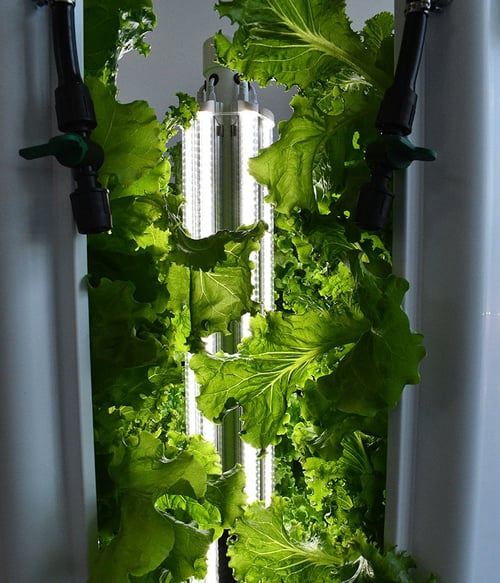The Best Science Activities for the Classroom: How Hydroponic Gardens Engage Students
For decades, traditional outdoor gardens have been a staple classroom activity. However, with the latest innovation in agricultural technology, indoor hydroponic gardening is becoming a fun and engaging approach to science education. Hydroponic gardening, a growing method that grows plants using a water-based, nutrient solution instead of soil, allows students to explore various scientific concepts that bring them beyond the textbook.
For educators and program coordinators seeking activities for students, hydroponic gardens provide a hands-on experience. These lessons encourage curiosity, scientific inquiry, and critical thinking. Here are all the advantages of bringing hydroponics into the classroom and why every teacher should put an indoor hydroponic system on their wishlist.
Hydroponic Gardens Promote Scientific Inquiry and Critical Thinking
Hydroponics provides a controlled environment where growers can observe, understand, and learn from plant growth. This makes it an ideal hands-on learning tool for the classroom, as it encourages scientific inquiry and critical thinking through experiments. Teachers can design experiments around their indoor hydroponics system, allowing students to investigate various nutrient solutions, light intensities, and environmental factors. Indoor hydroponic gardening is also multidisciplinary, integrating biology, chemistry, physics, and environmental science. The interconnectedness of the disciplines can provide a holistic understanding of how science is applicable in real-life situations.
From these analyses, students can approach hydroponics from a scientist's perspective as they formulate hypotheses, collect data, and draw conclusions. As a result, many students who explore the world of hydroponics develop problem-solving skills by addressing issues like nutrient deficiencies, pH imbalances, and poor plant growth. The global hydroponics market is slated to reach $25.1 billion by 2027, preparing many students for the future of agriculture.
A Hydroponic System Aids Classroom Lessons For Understanding Plant Biology and Growth
Hydroponics provides a unique opportunity for hands-on study of plant biology. From seed germination to flowering, students can observe real-life stages of plant development. Plant biology helps students learn and analyze root systems, leaf structures, and reproductive organs, enabling them to investigate factors influencing plant growth, such as light intensity, temperature, and nutrient availability. This can deepen their understanding of plant anatomy, physiology, and key biological processes.
Teaching Environmental Sustainability With A Hydroponic Classroom Farm
“What we do or don’t do right now will affect my entire life and the lives of my children and grandchildren,” said Swedish environmental activist Greta Thunberg. Climate change inspires many young people, like Thunberg, to become involved in environmental sustainability.
Hydroponic gardening, an eco-friendly farming method that promotes environmental sustainability through water conservation and reducing pesticides and fertilizers, is one of many ways teachers can prepare students to pursue knowledge and action.
Students can compare and contrast this methodology with conventional farming practices, allowing them to explore the environmental impact of both approaches. This can also inspire discussions of alternative agricultural practices and their potential benefits, encouraging students to become environmentally conscious stewards and seek solutions to global challenges. At the very least, from the precise nutrient dosing and water conservation that hydroponics requires, students can learn what it means to be resource-efficient.
An Indoor Classroom Garden Provides Year-round, Focused Learning Opportunities
Indoor hydroponic gardens like our Flex Farm grow produce and greens year-round. This makes it possible not to limit the use of hydroponic systems to seasonality. For educators, especially those in cold climates, this helps level the playing field of agricultural education. With more opportunities for experimentation throughout the school year, students can have more chances to develop skills and knowledge in sustainable farming.
As many hydroponics systems (like ours!) also have low maintenance requirements, educators won’t experience too steep of a learning curve in setup. Hydroponic gardening is much simpler than most people think. Our system, for example, has only two hours of regular maintenance per month, and the Fork Farms team provides comprehensive support on any troubleshooting. This keeps the focus where it should be – on learning.
Education in the Future of Food
In addition to scientific and environmental learning, hydroponics systems can also show students the pathway to the future of fresh and healthy food. Flex Farm, for instance, can grow 25+ lbs of fresh food every four weeks (28 days). The farm makes it possible to harvest up to 3,400 plants annually with 288 grow spots.
This new method of growing food is efficient, scalable, and transformative and allows growers to have minimal to zero food waste. Educators can integrate lessons about food waste and healthy eating with hydroponics, helping students understand the impact of wasting resources.
Hydroponic Systems Are Flexible and Scalable
Indoor hydroponic systems can be easily placed in a classroom. Flex Farm, for example, only requires nine sq. ft. of space and needs only a standard electrical outlet and accessible water source (such as a classroom sink.) Some providers (like us) have developed learning resources for the classroom and beyond. Our Farmative online community and educational resource center give educators access to curriculum ideas, activity guides, programs, and courses to bring into the classroom.
Explore the Future of Farming and Food
A modern classroom garden using a hydroponics system can be an exciting and engaging activity for students. Inspiring scientific passion, curiosity, and exploration, hydroponics is more convenient and effective than a traditional outdoor classroom garden.
Ready to get started? Our Flex Farm team is prepared to answer all of your questions.
Subscribe to our blogs
Is the Flex Farm right for you?
Connect with an expert member of our team and let’s work together to bring your growing experience to life. To help get you connected with the best person, please tell us where you are located.



